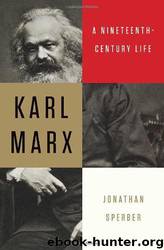Karl Marx: A Nineteenth-Century Life by Jonathan Sperber

Author:Jonathan Sperber
Language: eng
Format: mobi, azw3
Tags: Biography & Autobiography, Philosophers
ISBN: 9780871404671
Publisher: Liveright
Published: 2013-03-11T00:00:00+00:00
PART III
Legacy
10
The Theorist
IN THE TWO DECADES between 1850 and 1870, Marx developed the mature version of his philosophical, social, and economic theories. When we think of such theories, we imagine a bearded scholar poring for hours over tomes in the British Museum; but usually Marx’s theoretical pursuits had to be crammed in beside far more time-consuming activities: émigré politics, journalism, the IWMA, evading creditors, and the serious or fatal illnesses that plagued his children and his wife, and, after the onset of his skin disease in 1863, Marx himself. All too often Marx’s theoretical labors were interrupted for months at a time or reserved for odd hours late at night.
Even without these detours, Marx always tended to work slowly and revise constantly. He had difficulty getting the final version of his thoughts down on paper, so it is no surprise that he never developed the critiques of society and intellectual disciplines first planned in 1845. The results of his theoretical deliberations are frustrating to interpret, albeit for opposing reasons in different branches of knowledge. Marx’s writings after 1850 on philosophy, society, and history were fragmentary: snippets of journalism or suggestions from correspondence, relevant passages in political polemics, or economics treatises. In spite of occasionally mentioned plans, he never produced an extensive theoretical work, which has led commentators and interpreters to focus their attention on his 1840s manuscripts—incomplete, but at least substantial. By contrast, the problem with the writings on economics is that there was too much. Two books were published in Marx’s lifetime: On the Critique of Political Economy of 1859, and Capital, Volume One, of 1867. The latter, as anyone who has ever picked it up knows, is lengthy and dense. Besides the material that appeared in print, Marx left behind an enormous array of manuscripts on economics that Engels sorted through and edited into Volumes Two and Three of Capital. Further manuscripts on the history of political economy were later published as Theories of Surplus Value. But reducing the mass of handwritten manuscripts even to three thick books meant leaving out a large volume of unpublished writings, to say nothing of Marx’s extensive notes on economics and the many discussions of economic questions in his correspondence.
For this intellectual labyrinth, simultaneously fragmentary and overwhelming, a useful guide is Ferdinand Lassalle’s pithy description, written in 1851, of Marx as a thinker: “Ricardo become a socialist; Hegel become an economist.”1 At the very beginning of a two-decade period of theoretical contemplation and development, Marx’s perceptive disciple had focused on two key themes. He was undisputedly a follower of Hegel, but what did it mean to be a Hegelian after 1850, when a new and distinctly non-Hegelian philosophy—that of positivism—was in the ascendant? This new development posed a problem not just for philosophy per se but for an understanding of human history and human society. The other point of Lassalle’s remark was that Marx’s understanding of economics was shaped by the ideas of David Ricardo, the great English political economist and chief disciple of Adam Smith.
Download
Karl Marx: A Nineteenth-Century Life by Jonathan Sperber.azw3
This site does not store any files on its server. We only index and link to content provided by other sites. Please contact the content providers to delete copyright contents if any and email us, we'll remove relevant links or contents immediately.
| American Revolution | Civil War |
| US Presidents |
Fanny Burney by Claire Harman(25778)
Empire of the Sikhs by Patwant Singh(22163)
Out of India by Michael Foss(16309)
Leonardo da Vinci by Walter Isaacson(11895)
Small Great Things by Jodi Picoult(6085)
The Six Wives Of Henry VIII (WOMEN IN HISTORY) by Fraser Antonia(4784)
The Wind in My Hair by Masih Alinejad(4420)
The Lonely City by Olivia Laing(4112)
The Crown by Robert Lacey(4099)
A Higher Loyalty: Truth, Lies, and Leadership by James Comey(4024)
The Iron Duke by The Iron Duke(3636)
Millionaire: The Philanderer, Gambler, and Duelist Who Invented Modern Finance by Janet Gleeson(3565)
Sticky Fingers by Joe Hagan(3449)
Alive: The Story of the Andes Survivors by Piers Paul Read(3302)
Papillon (English) by Henri Charrière(3264)
Joan of Arc by Mary Gordon(3253)
Stalin by Stephen Kotkin(3081)
Aleister Crowley: The Biography by Tobias Churton(3015)
Ants Among Elephants by Sujatha Gidla(2920)
